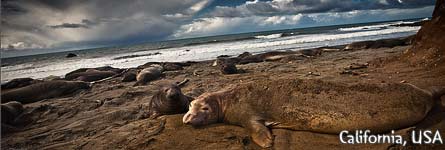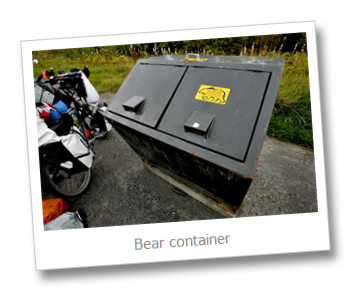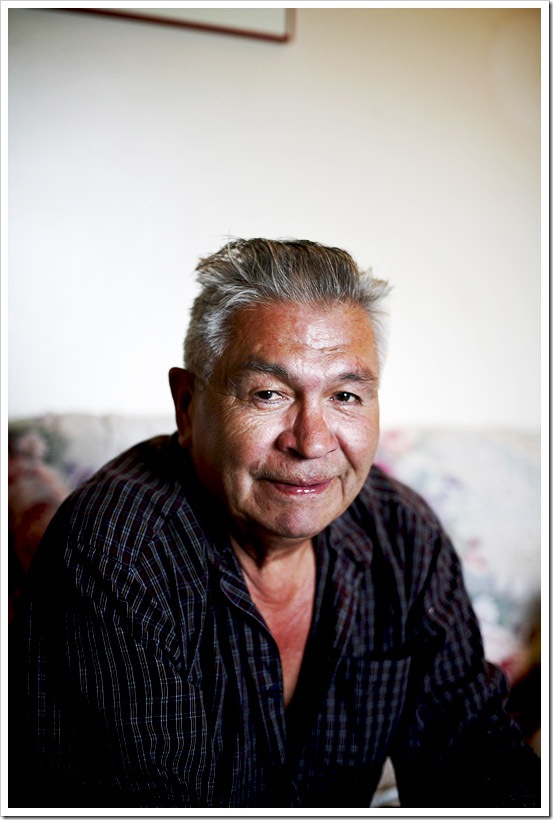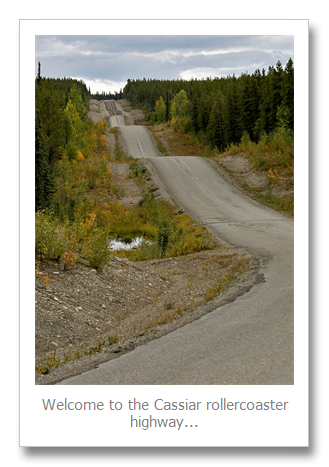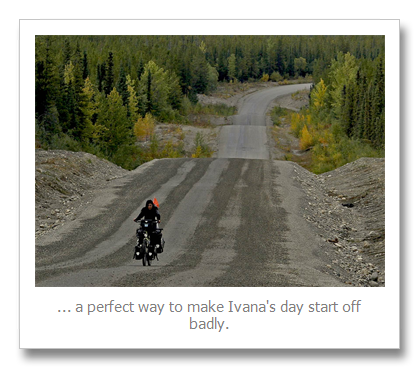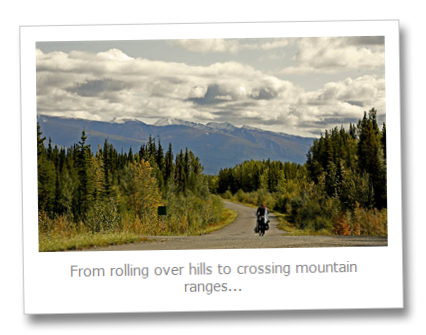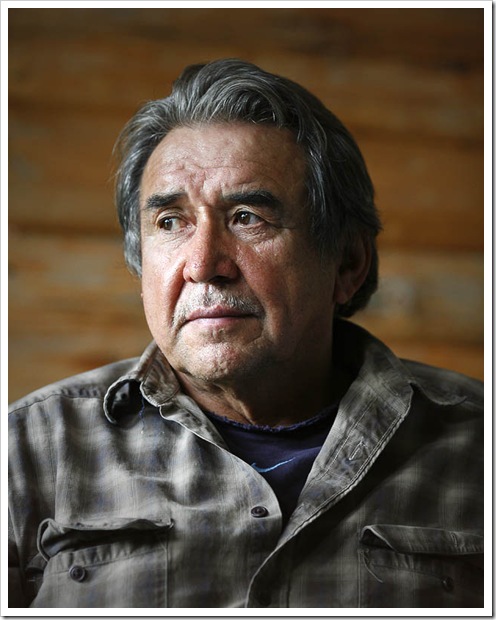Day 66-73, 15- 22 Sept 08: the Cassiar and Yellowhead Highway. Contained bears, no more wildlife?
September 23, 2008 by Harry
Filed under Trip reports, North America, Canada, British Columbia
15th September 2008: Stewart to Bonus Lake, 81km
We could not resist George’s offer to bring us back to the Meziadin junction. Though the ride from Stewart is beautiful, loosing a day –of which half would be uphill non-stop- cycling a stretch we had already done did not appeal. George was happy to get put of town and spend some more time with us, so we put the bikes in the back of the pick-up and 50 minutes later we got dropped off at the exact same spot where we had left the Cassiar Highway a few days before. Back to business!
After all the bear-less hours in Hyder, we got a pleasant surprise. I stopped to pick up CAD $3 in change from the shoulder: our total is now up to about 9 dollars in change found along the road, somehow people literally throw money away… Ivana came up to me and asked if I had stopped for the bear. Bear? Which bear? I looked ahead and saw a large black spot on the side of the road. Damn, she was right, a huge black bear was strolling in the grass. We filmed a bit and tried to warn a passing car, but he did not decease any speed and nearly hit the poor bear as he was crossing the road…
We had planned to stop for lunch and a few minutes ahead we rested near a so-called ‘bear-container’. No it does not contain bears, though that would be funny (funny/interesting and funny/haha), but it is a strong trash container. These are useful in more ways than one: the lids cannot be opened by pear paws so bears cannot get to the trash and will not get used to human food remains. As the sticker on it says: ‘be bear aware, a fed bear is a dead bear’ as once a bear is used to human food, it will no longer be afraid of humans and will have to be hunted down.
The containers have another very useful feature: the backside can be opened and campers can place their food bag inside, next to the hanging plastic bags hat are inside as well. So the supplies are safe from bears and other scavengers, but outside the actual trashbag, so everything stays clean. The availability of a bear container was one of the most important reasons for us to stop at certain places along the highways of Canada & Alaska; even though most are on ‘no overnight camping’ rest areas, we rather be breaking a non-enforced law than attract and feed bears…
It was clear that we were getting into the last and warmer part of the Cassiar Highway. Not only were the glaciated and snowy peaks disappearing out of sight, but we also encountered new types of animals: small yellow and black-striped suicidal caterpillars (even though only a few cars pass the Cassiar per hour, it takes the critters longer to cross it) and some small garden snakes, though mostly in the flat and/or dead variety.
Ivana and I always use to joke that we are collecting airmiles when we are climbing yet another hill and Newton would probably kinda agree as basically we are gathering gravitational energy. The long sweet downhills we always refer to as ‘free miles’ , even though we were riding in Canada, which is a metric country. It was nice to see that after a day of collecting airmiles, we not only cashed in our accrued miles for some free miles, but we ended up at the aptly named hidden but beautiful ‘Bonus Lake’ rest area to top it off. Read more
1000 Americans: Roger Johnson, Kitwanga: Good Morning, Canada!
September 17, 2008 by Harry
Filed under 1000 Americans
For the First Peoples, the land is the source of Life- a Gift from the Creator. “Mother Earth” is the center of their universe, the core of their culture , the origin of their identity as a people, the provider of their material needs.
“The land cannot be given or taken away, we belong to the Land; our birth does not sever the cord of life which comes from the Land, our spirituality, our culture, and our social life depend on it”.
Respect for all life – animals, insects, plans, mountains, rivers, skies & seas are inseparably interconnected. First peoples do not consider the land merely an economic resource. Their land depends on lives, and in relationship to the environment around them. They know that the land is to be shared. If you misuse the land, you are killing yourself. Remember the earth will survive long after you’re gone.
Traditional people think the land is there for everyone to use, the way our hand is there, the grass, the trees and animals are our flesh. nature is our religion, thank the Creator for what he has given us all.”
Roger A. Johnson, 30 august 1991.
‘Nii t’am lax ooks by’, is Roger’s original Gitxsan name, meaning ‘care for the people’ as well as describing ‘a frog on a lily pad’. His generation was influenced by residential schools, church and government, making them loose their mother tongue and culture. Roger still speaks the old language and works as a interpreter in discussions and court cases between government, mining companies and the First Nation elders.
Nowadays the Gitxsan youth is depressed and suicide rate is very high.
“We can’t cry over spilt milk! We must maintain our culture and our language. We need a huge cultural center to teach our culture and language to young and old.”
While we were talking with Roger, a car drove up. A very conservatively woman stepped out and gave Roger a booklet and drove off again. The others in her car did not come out. The cover of the booklet depicted a nice drawing of a traditional Indian sky burial. But the rest of it basically said that that was nice in the old days, but against the bible and all First Nations should switch to ‘modern’ Christian values and culture…
“I remember my Grandparents often saying to me, ‘You are my cane, You are my sunshine, You are my flower”.
Roger gave me a Gitxsan First nation flag, which has been on my bike since. Then he waved us goodbye from the stairs leading up to his frontdoor. ‘Do not forget to wake up every morning, and shout to the world: Good Morning Canada!’.
(Sources: our meeting with Roger; Partly quoted from the local article ‘Wisdom of the Elders’ by Zanna Ove; Speech of Roger A Johnson transcribed by Julian Burge)
Day 53-62: 2-11 Sep 2008: The Cassiar Highway: a wonderful wilderness with hills, gravel, jade, wildlife… and people
September 12, 2008 by Harry
Filed under Trip reports, Friendly people, North America, Canada, British Columbia
Of course we took the road less travelled 🙂 Highway 37, The Stewart Cassiar Highway, or simply The Cassiar Highway. All names for this infamous road, almost 1000km long, known for the lack of services, bad weather, bears and gravel patches. The latter issue had been solved we had been promised, but the other?
2nd September: Nugget City – French Creek, 58km
The adventure started sunny, but dark clouds appeared, especially on Ivana’s face when she noticed the first set of hills. “is this going to be like that for the rest of the road?” she asked. I truly did not know, but suspected that this was just the beginning…
Fortunately some nice people made our day by donating a full bag of cut-up watermelon, just what the doctor ordered as the sun had come out. Unfortunately the wind had come to and after a week of tailwind, we were not happy to have it in our face again, slowing us down.
Ivana spotted a black bear, right beside the road, I must have raced right past him on the downhill. At least that made her a bit happier and when we also found a nice deserted rest area called French Creek where we -after hanging our foodbags in the trees- could relax near a good campfire.
1000 Americans: Willy Williams, Stikine River ranch
September 5, 2008 by Harry
Filed under 1000 Americans, Friendly people
Holly Eden from Dease Lake had told us to visit Willie if we had the opportunity.
Willie is one of those persons that can fill a documentary all by himself. We arrived late, uninvited but were welcome and spend hours talking about his history, present and future. We talk about the history of the Tahltan people and the fights with the other first nations.
We verbally travel from the horror stories of the missionaries taking the First Nation children away to religious experiences of his friends, fights about lands and property to sharing very personal stories and advice about love & life. He lets us sleep in the first house he built, filled with more memories.
Besides being the host for a yearly 3-day gospel music festival at his ranch, Willie organises horseback riding trips through the wilderness of the nearby provincial parks: Stikine River, Spatsizi Plateau & Mount Edizia. Every trip is different and some clients come back regularly.
Willie showed us a book from a german photographer, about the area, almost completely shot during the trips he guided. No website, no email. “How do you get your clients?” I asked him. “I don’t know, somehow people seem to find me”, he replied.
More than a week later we would meet Willie again, in Smithers where we also met his wonderful wife Grace. Thanks for letting us into your life for a short moment Willie, it will last much longer than just the few hours we spent together.
ps: To make it a bit easier to get a special adventure that might just change your outlook on life, call Willie or Grace Williams in BC: 250-771-4301. Trips can take anything from a few hours to a few weeks.


